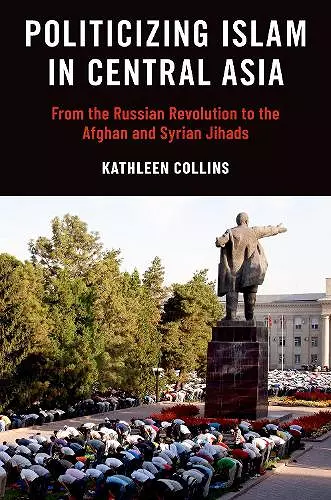Politicizing Islam in Central Asia
From the Russian Revolution to the Afghan and Syrian Jihads
Format:Hardback
Publisher:Oxford University Press Inc
Published:27th Jun '23
Currently unavailable, and unfortunately no date known when it will be back
This hardback is available in another edition too:
- Paperback£22.99(9780197685075)

This book provides a comprehensive history of Islamism in Central Asia, examining its rise as a political force post-Soviet Union and the impact of state repression on Islamist movements in the region.
Politicizing Islam in Central Asia by Kathleen Collins provides a comprehensive examination of the rise of Islamism in Central Asia, tracing its evolution from the Russian Revolution to contemporary times. Utilizing a wealth of Soviet-era archival documents, oral histories, and numerous interviews, Collins reveals the unexpected emergence of Islamism in a region that endured seventy years of enforced communist atheism. The book challenges the assumption that Muslims inherently support Islamism, a modern political ideology, highlighting the complexities of religious and political identities in the region.
Collins delves into the dynamics of Islamist movements within the USSR and the subsequent post-Soviet states of Tajikistan, Uzbekistan, and Kyrgyzstan. Through extensive ethnographic and historical research, she analyzes the strategies employed by various Islamist groups and their differing levels of success. The author argues that state repression of Islamic practices by both Soviet and post-Soviet regimes, combined with the spread of religious ideologies, served as significant catalysts for Islamist mobilization in Central Asia.
The narrative spans critical historical events, including the Tajik civil war, the Afghan jihad against the US, and the involvement of foreign fighters in the Syrian conflict. By tracing these developments, Collins provides valuable insights into the factors that have shaped the political landscape of Central Asia and the role of Islamism as a form of political opposition. This book serves as an essential resource for understanding the intricate relationship between religion and politics in this dynamic region.
"Remarkable in scope and depth, drawing on everything from interviews in the Ferghana Valley to jihadi propaganda in multiple languages, Collins' book is a contender for the definitive work on the rise of militant Islamism in Central Asia." -- Thomas Hegghammer, Senior Research Fellow, Oxford University, and author of The Caravan: Abdallah Azzam and the Rise of Global Jihad and Jihad in Saudi Arabia
"A groundbreaking study of Islamism's evolution in Central Asia, Kathleen Collins' remarkable feat of scholarship should be required reading for all serious analysts and observers of this important region. Collins' book offers irrefutable evidence that religious freedom is the best counterterrorism policy." -- Mike Croissant, US government counterterrorism officer (ret.)
"Politicizing Islam covers a lot of ground and is based on a massive amount of sustained original research. Collins traces three waves of Islamist mobilization, each one a response to state repression. Her use of interviews and focus groups allows her to bring society back in into the analysis. She makes a clearly thought-out argument on the basis of impressive research." -- Adeeb Khalid, Jane and Raphael Bernstein Professor of Asian Studies and History, Carleton College, and author of Making Uzbekistan and Islam After Communism
Collins achieves something extraordinary in this masterful and careful analysis of Islamism in Central Asia. Based on years of in-depth interviews, archival materials, and other sources, Collins traces the emergence of Islamist movements, from the moderate and democratic to the radical and militant in Kyrgyzstan, Tajikistan, and Uzbekistan. Along the way, she reveals the lived experiences of many Kyrgyz, Tajik, and Uzbek religious believers. Without demonizing Islam or sensationalizing Islamism, Collins enriches our understanding of both Soviet and post-Soviet religious repression and its unintended consequences: making Islam more resilient and fostering a religious basis for political opposition. Anyone endeavoring to understand the fabric of modern-day Central Asia should closely read Collins' scholarship. * Steve Swerdlow, Associate Professor of the Practice of Human Rights, University of Southern California, and former Senior Central Asia researcher at Human Rights Watch *
Highly recommended. Advanced undergraduates through faculty; professionals. * Choice *
Collins frequently writes with great nuance and sensitivity, as in the insightful discussionof sacred authority. Moreover, the book's latter chapters offer a lavishly documented description of post-Soviet Islamic radical movements, the first such comprehensive account to be written. * Eren Tasar, Journal of Church and State *
Collins frequently writes with great nuance and sensitivity, as in the insightful discussionof sacred authority. Moreover, the book's latter chapters offer a lavishly documented description of post-Soviet Islamic radical movements, the first such comprehensive account to be written. * Eren Tasar, Journal of Church and State *
ISBN: 9780197685068
Dimensions: 156mm x 235mm x 35mm
Weight: 939g
584 pages